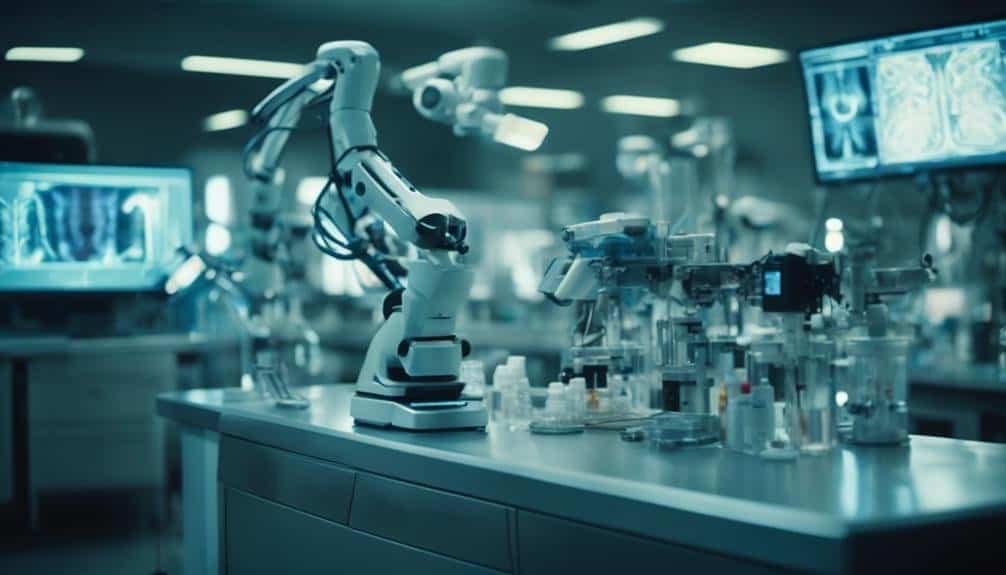AI in Healthcare Diagnostics: Advances and Innovations
In recent years, the integration of Artificial Intelligence (AI) in healthcare diagnostics has shown remarkable progress, revolutionizing the way diseases are detected and treated. From enhanced disease detection capabilities to personalized treatment approaches, AI has paved the way for data-driven diagnostic solutions that were once thought to be futuristic.
The automation of imaging analysis and the advent of virtual health assistants are just glimpses of the vast potential AI holds in transforming healthcare. However, as we explore these innovations, it becomes evident that ethical considerations play a crucial role in shaping the future of AI diagnostics in healthcare.
Key Takeaways
- AI enhances diagnostic accuracy and expands to predictive analytics and personalized medicine.
- AI-driven precision enables early disease detection and real-time health monitoring.
- Personalized treatment plans based on genetic data improve patient outcomes and resource allocation.
- Data-driven insights optimize diagnostics, predict health risks, and enhance patient care.
Evolution of AI in Healthcare
In the realm of healthcare, the integration of artificial intelligence (AI) has undergone a significant evolution, revolutionizing diagnostic processes and treatment strategies. The evolution of AI in healthcare diagnostics has been marked by tremendous advancements in improving diagnostic accuracy across various medical fields.
Initially, AI algorithms were predominantly used to assist healthcare professionals in interpreting medical images such as X-rays, MRIs, and CT scans. However, as AI technology progressed, its applications expanded to include predictive analytics, genomics, and personalized medicine.
One of the key areas where AI has shown remarkable progress is in enhancing diagnostic accuracy. AI algorithms can now analyze vast amounts of patient data to identify patterns and anomalies that may elude human detection. This capability has significantly improved the early detection of diseases and conditions, leading to timely interventions and improved patient outcomes.
Moreover, AI-powered diagnostic tools have demonstrated high levels of sensitivity and specificity, reducing the risk of misdiagnosis and ensuring more precise treatment planning. The continued evolution of AI in healthcare holds great promise for further enhancing diagnostic capabilities and revolutionizing patient care.
Enhanced Disease Detection
With advancements in artificial intelligence (AI) technology, disease detection capabilities in healthcare have been significantly enhanced. AI-driven precision plays a crucial role in improving diagnostic accuracy, enabling healthcare providers to detect diseases at earlier stages with greater precision. By analyzing vast amounts of data quickly and accurately, AI algorithms can identify patterns and anomalies that may be imperceptible to human observers. This leads to more timely and accurate diagnoses, ultimately improving patient outcomes.
Furthermore, real-time monitoring facilitated by AI technology allows for continuous tracking of patients' health status. This proactive approach enables healthcare professionals to intervene promptly when abnormalities or concerning trends are detected, potentially preventing the progression of diseases or complications. The ability to monitor patients in real-time also enhances disease surveillance efforts, aiding in the early detection of outbreaks and enabling swift public health responses.
Personalized Treatment Approaches
Personalized treatment approaches in healthcare leverage individual patient data to tailor medical interventions for optimized outcomes. By utilizing advanced technologies like AI, personalized care plans can be developed to cater to the specific needs of each patient. This tailored approach ensures that treatments are not only effective but also minimize potential side effects, leading to better overall patient satisfaction and health outcomes.
Key Aspects of Personalized Treatment Approaches:
- Precision Medicine: Personalized care plans are designed based on a patient's unique genetic makeup, lifestyle factors, and medical history.
- Targeted Therapies: Treatment optimization involves identifying specific therapies that are most likely to benefit a particular patient, increasing the chances of successful outcomes.
- Continuous Monitoring: Personalized treatment approaches often include regular monitoring of patient data to adjust interventions as needed, ensuring ongoing efficacy of the treatment plan.
Incorporating personalized treatment approaches into healthcare systems can lead to more efficient resource utilization, improved patient outcomes, and a shift towards more proactive and preventative healthcare strategies.
Data-Driven Diagnostic Solutions
Building on the foundation of personalized treatment approaches in healthcare, data-driven diagnostic solutions play a crucial role in leveraging patient information for more accurate and timely medical assessments. By employing innovative algorithms and machine learning techniques, healthcare providers can extract valuable insights from vast amounts of data, enabling them to make informed decisions and recommendations for patient care. These data-driven diagnostic solutions not only enhance the accuracy of medical assessments but also help in predicting potential health risks, optimizing treatment plans, and improving patient outcomes.
| Advantages of Data-Driven Diagnostic Solutions | |
|---|---|
| 1. Enhanced Accuracy | 3. Predictive Analytics |
| 2. Timely Medical Assessments | 4. Improved Patient Outcomes |
Automation of Imaging Analysis
The automation of imaging analysis in healthcare has revolutionized the field by streamlining and enhancing the process of interpreting medical images for diagnostic purposes. This advancement leverages image recognition technology and automation to significantly improve diagnostic accuracy and efficiency in healthcare settings.
- Increased Speed: Automation of imaging analysis allows for rapid processing of medical images, reducing the time taken for diagnosis and enabling prompt medical interventions.
- Enhanced Accuracy: By utilizing sophisticated algorithms for image recognition, automated systems can detect subtle patterns or anomalies that may be missed by the human eye, leading to more precise diagnoses.
- Improved Workflow: Automating imaging analysis not only boosts diagnostic efficiency but also optimizes workflow management by prioritizing critical cases, ensuring timely patient care.
AI-Powered Drug Discovery
With the successful automation of imaging analysis in healthcare, the integration of AI-powered drug discovery now stands at the forefront of transforming pharmaceutical research and development processes. AI technologies are revolutionizing drug discovery by expediting the identification of potential drug candidates, predicting drug efficacy, and streamlining the path to regulatory approval.
AI algorithms can swiftly analyze vast amounts of data to identify promising compounds for further testing, significantly accelerating the drug discovery timeline. By predicting drug efficacy more accurately through AI simulations and models, researchers can focus their efforts on compounds with higher success rates, reducing costs and time associated with failed drug candidates. Furthermore, AI can aid in navigating the complex regulatory landscape by ensuring that drug development processes align with regulatory requirements, increasing the chances of successful regulatory approval.
Virtual Health Assistants
Virtual Health Assistants, such as AI chatbots, have revolutionized patient care by providing immediate responses to medical queries and offering personalized health advice.
These assistants play a crucial role in remote patient monitoring, allowing for continuous tracking of vital signs and symptoms outside traditional healthcare settings.
AI Chatbot Applications
Utilizing artificial intelligence technology, chatbot applications in healthcare have revolutionized patient care by providing virtual health assistants that offer personalized and efficient support. These AI-powered chatbots play a crucial role in enhancing patient engagement and streamlining clinical decision-making processes.
Key benefits of AI chatbot applications include:
- 24/7 Availability: Chatbots provide round-the-clock assistance to patients, ensuring immediate responses to queries and concerns.
- Personalized Interactions: Through advanced algorithms, chatbots can tailor responses based on individual patient data, enhancing the overall experience.
- Data-Driven Insights: By analyzing vast amounts of healthcare data, chatbots can assist healthcare providers in making informed clinical decisions, ultimately improving patient outcomes.
Remote Patient Monitoring
The evolution of AI applications in healthcare has extended to Remote Patient Monitoring, facilitating the implementation of Virtual Health Assistants for enhanced patient care and clinical management. By integrating wearable technology, healthcare providers can remotely monitor patients' vital signs and health metrics in real-time, enabling proactive interventions and personalized treatment plans.
However, Remote monitoring faces challenges such as data security, regulatory compliance, and interoperability issues between different systems. Despite these hurdles, Remote Patient Monitoring presents telehealth opportunities that can improve access to care, especially in remote or underserved areas.
Patient engagement strategies, including interactive Virtual Health Assistants, play a crucial role in empowering patients to actively participate in their healthcare journey, leading to better health outcomes and increased patient satisfaction.
Predictive Analytics for Early Detection
In healthcare diagnostics, the application of predictive analytics plays a crucial role in the early detection of potential health issues. By leveraging machine learning algorithms and data analysis techniques, healthcare providers can predict and identify patterns indicative of diseases at an early stage, enabling timely intervention and improved patient outcomes.
- Predictive analytics enables early intervention strategies, allowing healthcare professionals to proactively address health concerns before they escalate.
- Machine learning algorithms sift through vast amounts of patient data to identify subtle changes or anomalies that may signal the onset of a disease.
- This technology assists in stratifying patients based on their risk profiles, aiding in the customization of preventive care plans tailored to individual needs.
The integration of predictive analytics into healthcare diagnostics not only enhances the accuracy of disease detection but also empowers healthcare providers to deliver personalized care that is preemptive and targeted, ultimately leading to better patient management and healthcare resource utilization.
Ethical Considerations in AI Diagnostics
Considering the integration of AI in healthcare diagnostics, it is imperative to address the ethical considerations surrounding this technology.
Privacy concerns in AI implementations, the development of bias detection algorithms to ensure fairness, and establishing accountability in decision-making processes are pivotal aspects that require careful examination.
These points underscore the need for a robust ethical framework to guide the responsible and equitable use of AI in healthcare diagnostics.
Privacy Concerns in AI
Privacy concerns surrounding the utilization of AI in healthcare diagnostics are a critical aspect to address in ensuring ethical considerations are met. The integration of AI technologies raises significant ethical implications related to data protection and patient confidentiality. Some key points to consider include:
- Data Security: Ensuring robust measures are in place to protect sensitive medical data from unauthorized access.
- Informed Consent: Transparent communication with patients regarding how their data will be used and shared in AI diagnostics.
- Regulatory Compliance: Adhering to data privacy regulations such as GDPR to safeguard patient information effectively.
Addressing these privacy concerns is essential to maintain trust in AI-driven healthcare solutions and uphold ethical standards in the field.
Bias Detection Algorithms
Addressing bias detection algorithms within AI diagnostics is paramount for ensuring equitable and reliable healthcare outcomes.
Ethical implications arise when algorithms exhibit biases that disproportionately affect certain demographic groups, potentially leading to inaccurate diagnoses or treatments.
Algorithm accuracy plays a crucial role in detecting and mitigating biases, ensuring fair and unbiased healthcare decisions.
By implementing robust bias detection algorithms, healthcare providers can identify and rectify potential biases in AI systems, promoting more inclusive and trustworthy diagnostic practices.
Continuous monitoring and refinement of these algorithms are essential to uphold ethical standards and improve the overall effectiveness of AI in healthcare diagnostics.
Awareness of bias detection algorithms' significance is fundamental in safeguarding against discrimination and ensuring equitable healthcare delivery.
Accountability in Decision-Making
In the realm of AI diagnostics in healthcare, ensuring accountability in decision-making is a critical ethical consideration that underpins the reliability and ethical integrity of diagnostic outcomes. Transparency and responsibility play key roles in establishing accountability within AI diagnostic systems:
- Transparency: Clear disclosure of how AI algorithms reach diagnostic conclusions fosters trust and understanding among healthcare providers and patients.
- Responsibility: Assigning clear roles and oversight to individuals involved in the development, deployment, and maintenance of AI diagnostic tools is essential for ensuring ethical decision-making.
- Ethical Guidelines: Adhering to established ethical guidelines and regulations helps uphold accountability standards and guides the responsible use of AI in healthcare diagnostics.
Future Outlook: AI Integration in Healthcare
How will the integration of AI revolutionize healthcare delivery and diagnostics in the upcoming years?
As AI continues to advance, its integration into healthcare systems holds significant promise for improving patient outcomes and operational efficiency. However, several challenges must be addressed for seamless integration. One major obstacle is the complexity of integrating AI systems with existing healthcare infrastructure. This requires substantial investments in technology and workforce training to ensure successful implementation. Additionally, concerns around AI regulation, including data privacy, security, and ethical use of AI in healthcare, must be carefully navigated to build trust among patients and healthcare providers.
Despite these challenges, the future outlook for AI integration in healthcare is promising. AI-powered diagnostic tools have the potential to enhance accuracy, speed, and cost-effectiveness in disease detection and treatment planning. By leveraging AI algorithms to analyze vast amounts of patient data, healthcare providers can make more informed decisions, leading to personalized and effective care.
As AI technologies continue to mature and regulations evolve, the integration of AI in healthcare is poised to revolutionize the industry, offering new possibilities for improved healthcare delivery and diagnostics.
Conclusion
In conclusion, the integration of AI in healthcare diagnostics has revolutionized disease detection and treatment approaches. The advancements in data-driven solutions, automation of imaging analysis, and predictive analytics have paved the way for more efficient and accurate patient care.
As AI continues to evolve, it will play a crucial role in transforming the healthcare industry. Like a well-oiled machine, AI diagnostics will streamline processes and improve patient outcomes in the future.







